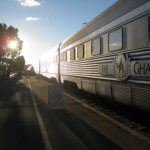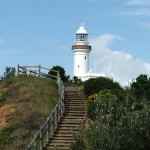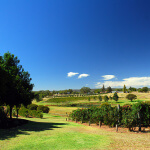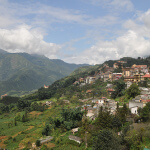If you’re planning to travel to Australia, check out this helpful Australia travel advice – tailored to the independent traveller travelling alone – to get an idea of what to expect and make the most of your holiday.
If you like this article and want to be updated about future articles, don’t forget to register for the monthly newsletter of Don’t worry Just travel.
Best time to visit Australia
You can plan your holidays in Australia pretty much at any time of the year, because there’s always some place in this vast country with great weather. During winter (June to August), the Australia climate is cold in the southern end, but fantastic in the northern and central parts. Conversely, when it’s hot and humid in the north, the south is just perfect. The Australian weather in the summer season (December to February) is most popular among travellers. But if you want to stay away from peak-season prices, then go during the shoulder-season months of March/April and October/November. In any case, avoid the peak school holiday period in January.
Do you need a visa to travel to Australia?
Yes! For your trip to Australia you – with the exception of just those holding an Australian or New Zealand passport – need to apply for a visa or an Electronic Travel Authority (ETA).
How to get cheap Australia flights
Forget about the peak season (December/January) if you want to get your hands on a cheap flights to Australia ticket. The cheapest flights are usually on offer from April to June. Also, book as early as possible, because that can make a difference. Do your research on the internet to compare airlines, as many deals on cheap flights Australia are available online, or book with a travel agent.
Generally use the following tricks to get cheaper Australia flights
- Book your flight more than six months in advance
- Book your flight about ten weeks before you want to travel (as a result of cancellations seats may have opened up)
- Fly Tuesday through to Thursday
- Choose flights with one or two layovers
Here are five of the best places to visit in Australia
Make sure you visit the Great Barrier Reef in Cairns, Queensland. This famous natural wonder is the biggest coral reef in the world and stretches about 2300km along the Queensland coast.
Uluru (Ayers Rock) in the Northern Territory should also be on your itinerary. Visiting this iconic, colossal rock is awe-inspiring to say the least.
Check out the Sydney Opera House (here our Sydney article), one of the seven modern wonders of the world, and right next to the spectacular Harbour Bridge.
Take a day to embark on the Great Ocean Road, a 243 kilometre stretch of road in Victoria’s south-east coast, with plenty of amazing scenery to see.
Visit the city of Melbourne in Victoria. Known as the cultural capital of Australia, it has plenty to offer with fantastic fine food restaurants, shopping, the world-renowned Royal Botanic Gardens, and many popular sports events throughout the year.
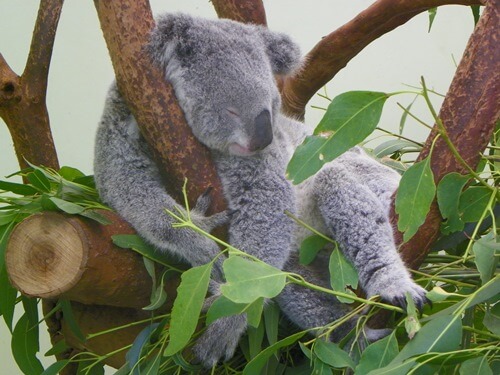
Travelling around Australia
Unless you’re planning on going on a great Australian road trip, the best way to move between Australian destinations is by flying. Domestic airlines offer affordable and regular services, though it’s the most expensive way to get around. Within a city, buses are a relatively cheap way of getting to places. Other types of public transport include trains, monorail, light rail, ferries and trams. If you’re planning to cover longer distances in your Australia trip, you might want to consider getting around by car or coach.
Australia travel advice regarding Australian money and budget
You can get a decent meal in Australia for anywhere between 10 – 20 USD. Sometimes you’ll be able to get meals for cheaper, other times you might have to pay a bit more. A dorm in a hostel costs 20 – 35 USD, while private rooms cost between 65 – 100 USD per night. Or you might choose to stay at a budget hotel, which costs from 80 USD per night for a double room with a private bathroom. Local city buses and trains can cost 2-3 USD, but for the more popular option of renting a car or camper van, budget for around 40 – 50 USD a day.
Telephone calls and internet
Optus, Telstra and Vodafone are the main telephone companies in Australia. You can buy a two AUD (Australian dollar) prepaid SIM and get a good amount of calling time, SMS and internet for a reasonable price. But if you want cheaper rates, go with a smaller company like Dodo, which offers a two AUD pay-as-you-go SIM and cheap data add-ons. You can get free Wi-Fi in many retail chains like McDonald’s, and independent cafés. Internet access – not always for free – is also available at libraries and accommodation.
Taxi and co.
Taxis in Australia are generally reliable and charge by the meter. Fares can be quite expensive though, so taxis are maybe only good for when you urgently need to get somewhere.
Rent a vehicle?
Australia is a big country, so public transport can’t always be relied on, especially outside the big cities. The roads are good and relatively safe in Australia and offer the best way to travel. If you have a license and the money for it, go ahead and rent a car, preferably a 4WD, or a camper van, which is becoming a popular option among travellers who want to explore. Don’t forget, that in Australia they drive on the left hand side.
Public holidays and opening hours
National Australian public holidays include New Year’s Day, Australia Day, Good Friday, Easter Monday, Anzac Day, Christmas Day and Boxing Day. States and territories also celebrate other public holidays like Labour Day and Queen’s Birthday. On public holidays, most banks, shops and other services close. But Australian tourist attractions tend to stay open, although they get busier during these times since many people are on a break. Be aware, that most Australian shops close as early as 7 pm, some even earlier. Getting a decent dinner becomes difficult after 8:30 pm.
Language
The official language in Australia is English, so communication won’t be a problem.
Diseases, vaccinations
If you’re coming from a yellow fever-infected region or country to Australia within a six day period, then you need proof you’ve had a yellow fever vaccination. In general, regardless of destination, travellers should be vaccinated for tetanus, diphtheria, measles, mumps, rubella, polio, chickenpox and hepatitis A and B. Though these diseases are not prevalent in Australia, outbreaks can still occur.
Crime and annoyances
Australia is one of the safest countries you can visit, but that doesn’t mean you shouldn’t take any precautions. Always lock your rooms and cars, and don’t leave valuables unattended. Don’t wander around dimly lit areas on your own.
Trying new foods?
There are some dubious Australian dishes like witchetty grub, grilled crocodile, emu meat and grilled kangaroo that the adventurous may want to try. But if you want to play it safe – and it’s recommended you do – why not try tasty Barramundi fish, the Aussie meat pie, Pavlova and delicious sponge lamington cake.
Outdoors for a long time
Best Australia travel advice for when you’re outdoors: Always apply sunscreen, and wear a hat and sunglasses to protect yourself from the strong UV rays. Even when it appears to be cloudy, have it on. Flies and mosquitoes can be a bother in the summer, so wear insect repellent; Aeroguard is a popular one in Australia. Drink lots of fluids to prevent dehydration.
How are the people?
The people are generally friendly and understanding. If you get lost or want good directions for a place, they’ll be happy to help.
Special Australia travel advice
- Don’t underestimate the usefulness of a good map if you plan to explore the outback.
- Bring warm clothes even if you’re travelling a warm season, because you never know with the weather. It can get cold and rain randomly in the summer.
- Have a travel insurance policy that covers activities like skydiving, diving, bungee jumping and abseiling, since Australia has plenty of outdoor activities to offer.


